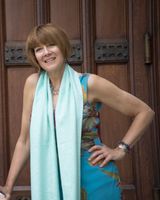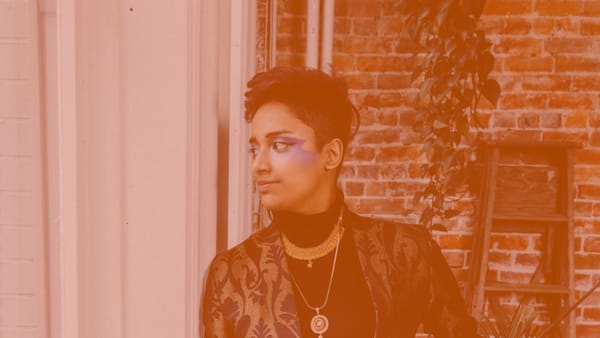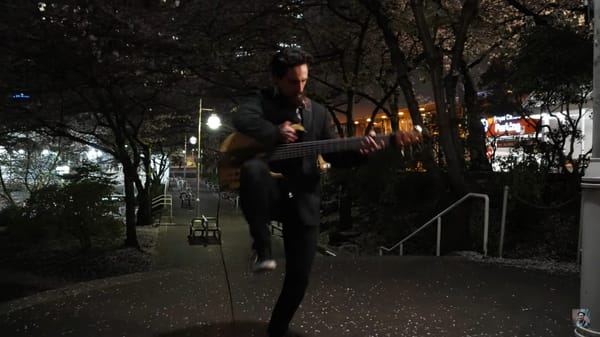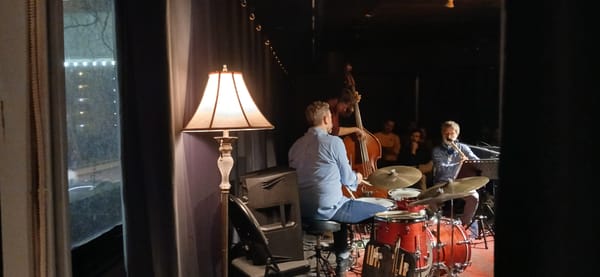Laura Anglade: Vocals, Skills, Interpretation of Standards
Laura has moved to New York City as her star rises in vocal jazz; she plays Frankie's Sep. 28

Laura Anglade is a rising star of note in the world of vocal jazz. During covid, I discovered Laura's artistry and relished the many videos that she shared: the duo performances with her good friend Virginia Frigault-MacDonald, the solo performances as Laura sang and played her ukulele, as well as the performances with her bassist and partner Jonathan Chapman alongside others.
I listened to Laura’s debut album I’ve Got Just About Everything repeatedly, enjoying and appreciating Laura’s understated and pure approach to singing.
I delighted in her Juno-nominated recording Venez Donc Chez Moi, a beautiful duo album with guitarist Sam Kirmayer.
There’s a calm, elegant and soothing quality to Laura’s voice with which I am fascinated. She can swing with ease, improvise, and sweep you into the story of a song.
I was unable to attend Laura’s previous Vancouver shows, but I do have seats booked for her September 28 show at Frankie’s Jazz Club. I'm thrilled that Laura was able to take the time in her busy recording and touring – and moving to NYC! – schedule to answer some questions in advance of her return. Welcome back to Vancouver, Laura!
KARIN PLATO: What's your favourite thing about singing music in the jazz genre?
LAURA ANGLADE: I sing standards because I love how timeless the stories are. I can change the way I interpret a song depending on my mood. Sometimes I feel like letting the audience in, other times I want to put up a wall, and that’s okay too.
The tunes tend to find me at the right time in my life, which is so special. There’s a magical quality to that, actually. I don’t necessarily go digging for them. I grew up listening to a lot of these songs as well. With some tunes, you can leave them and come back to them years later after having learned from a situation, you come back with a more mature perspective, as if finally coming to terms with the lyrics: oh, that’s what this line meant, I didn’t understand it until right now. It’s like rereading a novel after gaining a bit of life experience. The story takes on a whole new level of meaning you did not think possible. I love that about the songbook. It is personal, there is a song for everyone.
KP: When did you start studying music, and what were the instruments you studied?
LA: I started out with classical piano. My mom taught me. I detested practicing; I was not disciplined. I had a good ear, so I was able to learn the songs by ear, mostly, but sight-reading was always a chore. It is funny, because I find myself revisiting the classical repertoire nowadays and having a newfound respect and love for it as an adult.
I played the flute in my elementary and middle school band for a bit, but that wasn’t for me either. I always loved singing, I sang in the car, I sang in choirs. It was really when I started to take voice lessons with my teacher in high school, Matthew Surapine, that I developed a real passion for it.
I was always drawn to musical theatre, I had this dream that I could get the lead part in the play and was so shocked and surprised that I didn’t. I could sing the songs, I was just too shy in front of an audience, so I got stuck in the back. I never got to have the spotlight as a kid. I always knew I had something to share, though, deep down. I had this obsession with getting my point across.
I studied translation in university. I'm a big reader of classics and reading in general, I find it fascinating to be able to transfer an author’s voice through the gift of language so that another culture can appreciate the same story. I was born an interpreter, I guess.
I remember my parents would have dinner parties at home. I was just starting to speak, a lot of gibberish of course, when I was that young, but there was one instance – I don’t remember this, but my mom tells this story – I threw a tantrum at our family friend because I could tell he wasn’t understanding what I was saying, and it was driving me mad! So, being heard was always something extremely important to me It’s funny thinking back on it now, demanding to be heard.
KP: Are there particular vocalists or instrumentalists over the years that have influenced or inspired you?
LA: I go through phases, but off the top of my head... Barbra Streisand, Shirley Horn, Blossom Dearie, Bob Dorough, Joni Mitchell, Michel Legrand, Bill Evans, Billy Strayhorn, Erroll Garner, Lorez Alexandria, Nancy Wilson, George Shearing, Anita O’Day, Carmen McRae, Sarah Vaughan.
KP: During the recording process, do you have some specific things you do, a ritual if you will, to enable a successful and positive recording experience?
LA: No ritual, I just go in and do it. I try not to plan too much. I'm a big believer in doing full takes from start to finish. I don’t like stopping and starting or going back to fix things. I’d rather treat it like a gig, it’s more honest that way.
KP: You are moving to New York City. Has it been in your plans all along or have recent music projects made this the ideal city to relocate to?
LA: Yes! I moved here nearly three weeks ago now. It's been a long-term project for a while, for Jon [Jonathan Chapman] and myself. I’d say both. I’ve been playing here pretty often, back and forth between Canada and the US.
KP: Regarding your musical skills, which has come more easily to you: ear training or sight reading? Or, do you possess both abilities equally?
LA: I learn by ear. I can sight-read basic things, but as far as charts and things like that, I hire people to make them for me, I don’t have a concept of harmony or what that translates to on paper.
KP: From the most important to the least important, could you put these qualities in order regarding musicianship: intonation, time and groove, range and flexibility, improvisational skills, colour and dynamics, and interpretive skills?
LA: That’s a really hard one. I’ll try my best. Interpretive skills... the story always comes first for me, always. I was talk to speak when I sing, thanks to my teacher. This way, I do not fall into mimicking or imitating. This is what draws people in, I guess. The acting part of it, it’s my role to bring out the words and to be intentional with the responsibility I have carrying the weight of those words, especially ones that are not my own. I take that very seriously.
I always try to create an arc in the story, with my voice, with the ensemble and the arrangement. The story has to go somewhere, is it plot heavy or simply descriptive? That will change how I tell the story. I do a lot of word painting and lyric analysis before singing a song. I never want to keep it one-dimensional or fall into the trap of something too expected or into what an arrangement should sound like, the rules it should follow. This is what I love about Billy Strayhorn’s writing, to use an example.
A good time feel is going to ensure you sing with the ensemble and not over the ensemble. Ehen you all lock in together, that’s when the magic happens, so it’s definitely important. I think it’s definitely crucial to have good technique but to keep that for the practice room. Once you’re performing, you shouldn’t be thinking about technique in the moment. You have to trust it. Like studying for an exam: once you’re at the exam, you just have to trust that you retained the information, and there’s an element of letting go.
Improvising is fun, it doesn’t just mean scatting, I think improvising over the words and being able to paraphrase properly is what this art form revolves around, definitely. It helps you stay present and keep things interesting. I don’t know that I would make this less important than intonation, they’re about the same for me. I’m a big believer in only taking a scat solo if you didn’t have enough to say the first time. I treat it like a language, not a skill. The quality of the scat solo is important too, do you leave space? Do you listen? Billie Holiday had [air quotes] one of the narrowest ranges of any singer, and she’s the greatest of all time!
KP: Do you have certain composers of songs that you favour from the great American songbook?
LA: Dorothy Fields. I was fortunate to be mentored by her son, growing up, my dear friend David Lahm, who really taught me how to deliver a song. I owe everything to him and Matthew. I love Dorothy’s lyrics, so great. Cy Coleman, a big, big one for me. I also love Cole Porter, Jimmy Van Heusen, Billy Strayhorn, Harold Arlen, Irving Berlin...
KP: Do you compose songs and lyrics yourself as well as being an interpreter of other people’s songs?
LA: I write lyrics, from time to time, but no, I don’t do originals. I like to step into a role and tell other peoples’ stories.
KP: Aside from jazz, are there other genres of music you enjoy?
LA: Yes! I love folk and some pop: Joni Mitchell, Crosby, Stills, Nash, and Young, Simon and Garfunkel, Norah Jones... Grew up listening to lots of rock, big fan of Genesis, Sting, Tedeschi Trucks Band... I like bluegrass too, Alison Krauss. And classical music, especially the impressionist composers. I love Satie, Ravel, and Debussy.
Thank you, Laura! All the best for your adventures ahead in NYC including your upcoming album release, Get Out Of Town.




